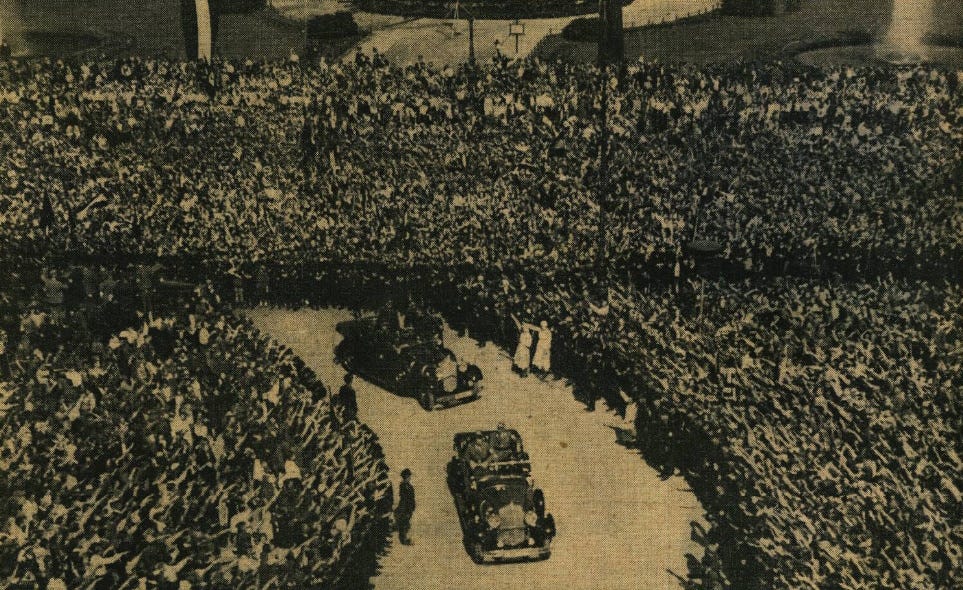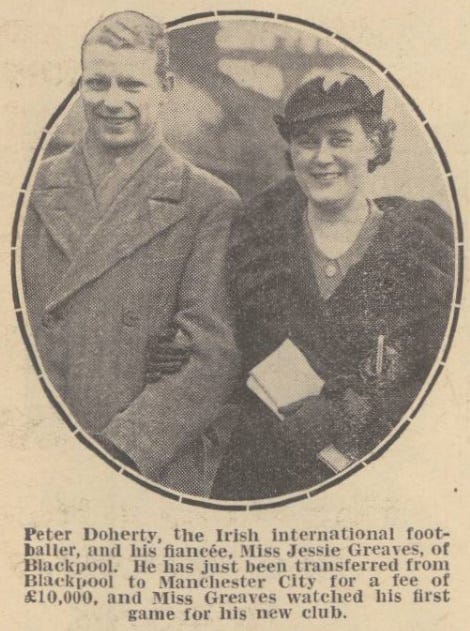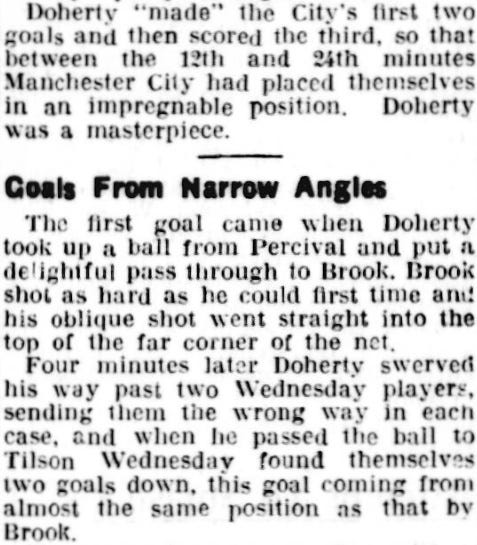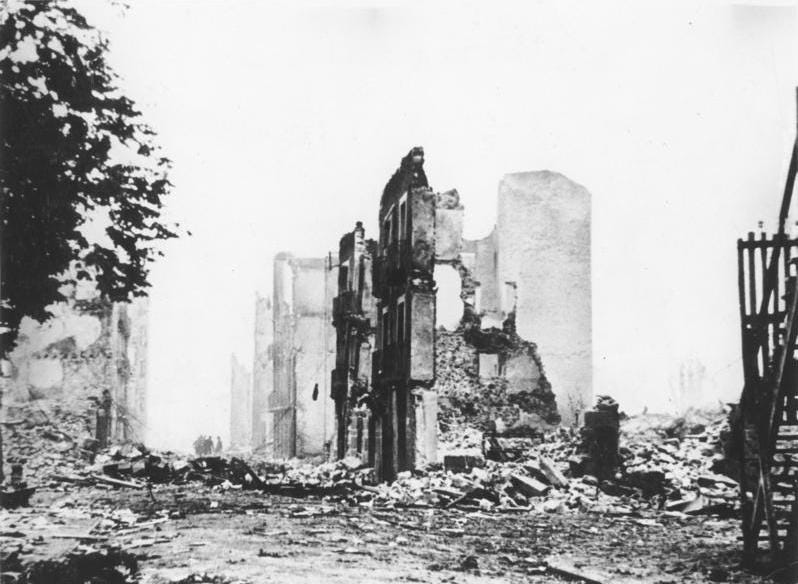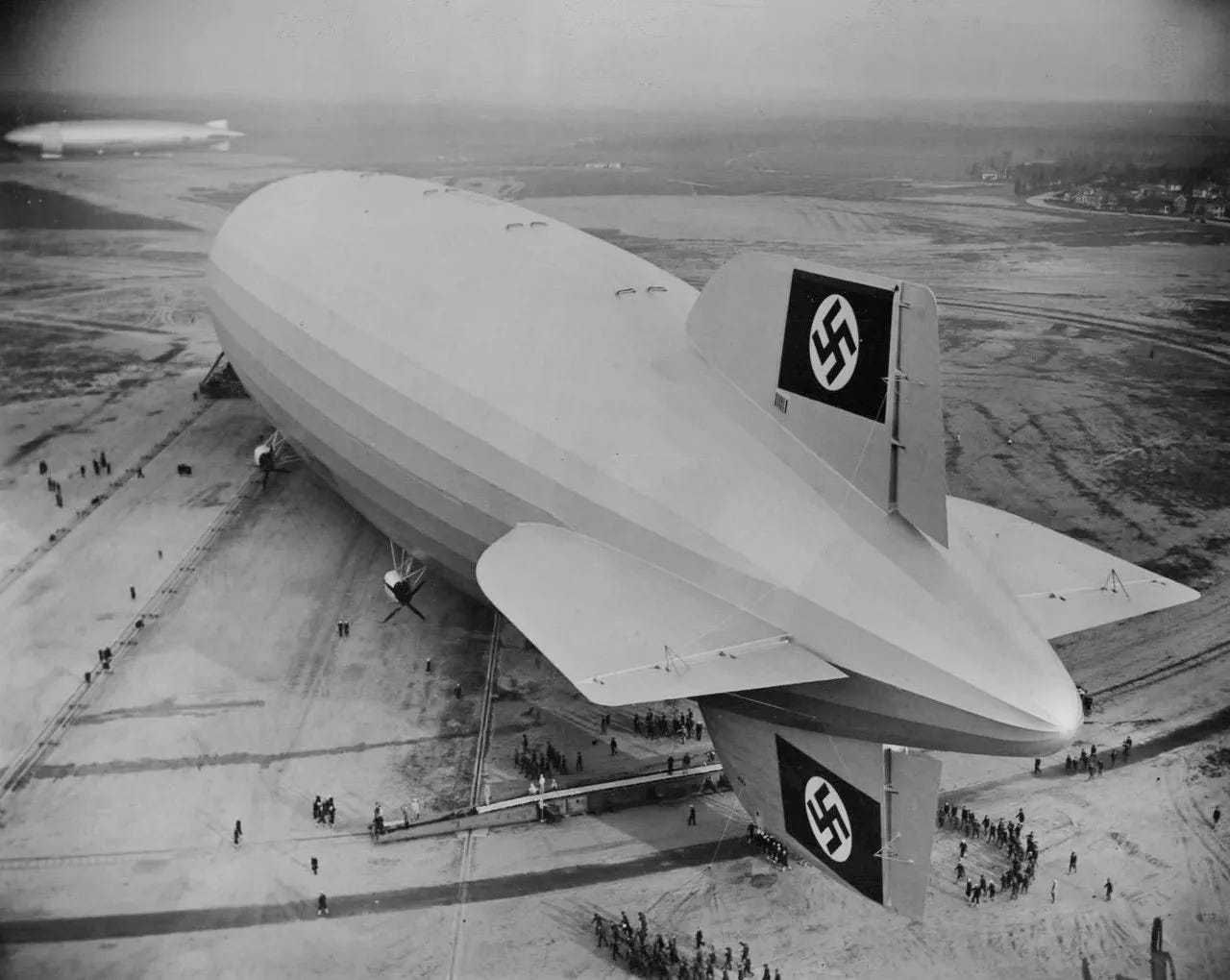The Day City Stood Up To The Nazis
On 1 May 1934, the day of City’s FA Cup homecoming, another giant parade took place in Berlin. It too was broadcast live on radio.
'A forest of hands were raised in the Nazi salute' when Adolf Hitler arrived to address an estimated two million people in Berlin's Lustgarten. Around 14 million more listened on the radio.
The contrast with City’s parade was noted the next day in the Liverpool Echo:
‘Thousands assembled in the streets, not to hear political speeches, not to hear a dictator, but to pay tribute to a Yorkshireman bringing the Cup to Lancashire.’
Three years later League champions City went to Berlin—and were thrust into the frontline of the propaganda battle between democracy and Nazism.
City finished 4th in the League the season after their Cup win, but slipped to 9th in 1935-36. However, the signing of Blackpool’s 22-year-old inside forward Peter Doherty in February 1936 would propel the club to their first-ever title.
The club record £10,000 fee was just £647 less than the British transfer record set in October 1928 when David Jack, also an inside forward, moved from Bolton to Arsenal.
Doherty soon repaid it, scoring 30 times in 41 League matches in the 1936-37 season, while helping winger Eric Brook to his record goal haul of 20.
On 24 April 1937, three City goals in 12 minutes at home to Sheffield Wednesday sealed the title. Doherty brilliantly created the first two, then scored an even better one himself.
City had been unbeaten in the League since Christmas Day. No one now doubted they were the best team in the land.
Two days later, at around 4.30pm Spanish time, warplanes of the Luftwaffe's Condor Legion launched a raid on the Basque town of Guernica. After two hours their incendiary bombs had reduced the town to rubble and left hundreds dead.
Germany had introduced the world to Total War.
On 1 May, City’s final League game of the season, a 2-2 draw at Birmingham City, took their unbeaten run to 22 League games. That same day Picasso started work on his painting, Guernica, which would take him 35 days to complete.
On Monday 3rd, a party of 16 City players, five club officials and four wives set off on a tour of Nazi Germany. It had been arranged by the FA and meant the title celebrations had to be put on hold until the summer.
Germany were now preparing for the 1938 World Cup. German sports minister, Guido von Mengden, had reportedly declared,
“National Socialism has restored the meaning of sport. Footballers are the political soldiers of the Fuhrer.”
And with English football commonly viewed as the best in the world, a defeat of the English champions would be a huge propaganda victory for the Nazi war machine.
Germany had suffered a shock 2-0 defeat by Norway in the quarter-finals of the 1936 Olympic Games in Berlin. But they were now managed by Sepp Herberger, who later led West Germany to the 1954 World Cup.
The early tour games got very little coverage in Britain, most likely because British journalists were not allowed to accompany the side. But Doherty’s 1947 autobiography, Spotlight on Football, provides valuable insights. He recalled,
'The German teams we played were trained to perfection. Most of the players were in the Army, and were sent away to special camps to prepare for the games. We had just completed a tough, hard season, and although we were keen to win, we couldn't help feeling it was all part of an enjoyable holiday.
The Germans, of course, didn't share this holiday feeling at all. They played like demons.'
City drew 0-0 in Duisburg on 6 May. Later that day, the German airship Hindenburg burst into flames in the United States, killing 36 and prompting eyewitness radio presenter Herbert Morrison’s anguished exclamation, ‘oh the humanity!’ It was the largest airship ever made, and its destruction was a huge dent to Nazi pride.
According to Doherty, their hosts pulled out all the stops in-between games.
'We really were 'killed with kindness'. There was rich food in plentiful quantities wherever we went, and a succession of sight-seeing tours and motor-coach trips had been arranged for us, which proved very nearly as exhausting as the games themselves!’
A 1-1 draw in Wuppertal on 9 May continued City’s unbeaten run. On the 12th, the day of George VI’s coronation (his brother Edward, who had strong Nazi sympathies, had abdicated), they beat a German XI 3-2 in Schweinfurt.
Four days later City’s players watched Germany beat Denmark 8-0 at the Hermann Goring Sportfeld in Breslau (now Wroclaw, Poland). That team, which became known as Breslau-Elf (The Breslau Eleven) had been rebuilt by Herberger using Schalke's Kreisel system of quick passing.
The Germans were now ready for their showpiece game. On 19 May, City took on the Nazi's strongest XI in front of a 70,000 crowd at the Olympic Stadium in Berlin. This time, the western media were allowed in for the event. Reuters and the Manchester Guardian sent reporters, while British Movietone sent a camera crew.
Doherty remembered,
'The whole place was peppered with armed Nazi guards, and getting past them to reach the dressing-rooms was an ordeal.’
No British team had ever refused to give a Nazi salute whilst playing in Germany. But this was a team like no other.
'We were expected to give the Nazi salute at the line-up before the match started; but we had decided merely to stand to attention. When the German national anthem was played, only eleven arms went up instead of the expected twenty-two!'
After going a goal down, City scored twice. But as City’s players tired in the second half the Germans scored two more. The high-ranking Nazi officials watching the game had got their propaganda victory. Well, half a propaganda victory at any rate.
Unfortunately, the only known footage of the game is no longer available online. So here’s a picture of what the England team did in the same stadium a year later.
City also lost the final game of the tour 3-2 in Stuttgart. But Doherty leaves us with one more memory of the tour.
'The Germans used a smaller ball than ours, and, as we had taken a supply of T-balls, it was agreed to play with one of each in each half. But whenever our ball appeared, it was always booted out of the ground as quickly as possible—in the hope that, if it were lost, their small ball would be used again!'
So that's official then. The Nazis had small balls. Except Goebbels, of course.
On Wednesday I’ll be posting a piece called If City Was A Racing Car.
The best way to make sure you don’t miss anything is to subscribe for free below and have stories sent straight to your inbox. Paywalls, like any sort of wall, keep people out. I want very much to keep this work available to everyone but I also need to make a living. If you can, please consider supporting my work with one of the voluntary subscription options.
Or if you want to help out with a one-off donation you can Buy Me A Coffee.


